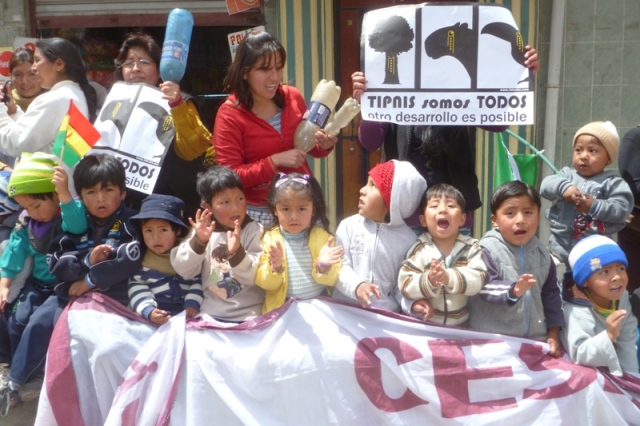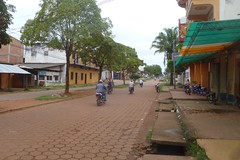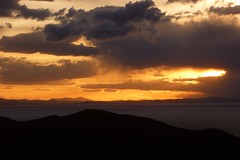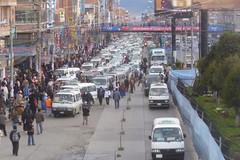Indigenous march in defense of TIPNIS arrives in La Paz
19 October 2011
Dario Kenner, La Paz
Daily updates on TIPNIS conflict at Twitter: @dariokenner
Facebook Page: http://www.facebook.com/BoliviaDiary
It was always going to be a historic moment when the march by indigenous movements finally arrived in La Paz after setting off over two months ago from the Amazonian town of Trinidad. But no one expected there to be tens and tens of thousands of people from the city of La Paz lining the route showing their support and solidarity. Indigenous movements have marched to demand the government of President Evo Morales does not build a road through the middle of an indigenous territory and national park called TIPNIS (detailed background and latest blog).
At 8am I was with the march as it set off from the outskirts of La Paz. It took 7 hours to cover around 10km winding down into La Paz because of the huge numbers of people who turned up to see the indigenous marchers make their historic descent into the city. There was a carnival atmosphere as the people of La Paz celebrated and saluted the enormous effort and sacrifice these marchers have been put through over the last two months. Whatever one thinks of the march and its aims, the feat of marching over 500km from Bolivia´s tropical Amazon to the highlands at over 4,000 metres above sea level, has to be recognised. On top of this the marchers carried on despite being repressed by the Bolivian police on 25 September. We still do not know who gave the order.
Video: https://www.youtube.com/watch?v=vxPAhShY2xk
Now the march has got to La Paz what happens next? There will be dialogue between the indigenous marchers and President Evo Morales, most probably tomorrow morning. President Morales offended the marchers by not appearing when they passed through the main square (Plaza Murillo) where the Presidential Palace is located. Tonight several of the key leaders of the march along with around 100 marchers will spend the night in the Plaza Murillo until they get a message from President Morales confirming the time and location of the meeting. Starting dialogue again will be a positive step forward to trying to find a solution to the TIPNIS conflict. The aim is a solution that suits all sides. But with the preliminary results of the first judicial elections on Sunday and now the huge show of support for the TIPNIS march from the people of La Paz the Bolivian government has had some very clear signals of discontent with its policies. Will it start listening to these signals? Let´s see how the dialogue goes tomorrow….
For those who want more detailed information there are two interviews below the photos.
As the march set off Paola Arnibar who went to the outskirts of the city to greet the march told me: “We are supporting the march. I took a day holiday to show our love and respect for the bravery they have shown in their two months of marching. We hope the government will annul the contract (with Brazilian company OAS) and will struggle for this. But with this President you never know”.
Among the people lining the route were children from primary schools.
There were emotional scenes as children went up to the indigneous TIPNIS marchers who set off from Trinidad over 2 months ago.
The people of La Paz welcomed the march with drinks, food and even live music at some points.
The march made its way past the main stadium in La Paz.
Huge crowds wait to greet the indigneous march in central La Paz.
The march made it to the main square in La Paz, the Plaza Murillo, location of the Presidential Palace. President Evo Morales did not make an appearance to welcome the march.
The marchers finally got to Plaza San Francisco where there were speeches by the main leaders on the TIPNIS march.
Interviews on the march
Rafael Quispe, Mallku of the Commission on Extractive Industries of indigenous highland movement CONAMAQ
Will the march enter Plaza Murrillo? (main square in La Paz – at the start of the day it was not confirmed the march would be able to enter the square)
The square is not the hacienda of Interior Minister Wilfredo Chávez. He does not own the square, we the people are the owners. We are going to speak from government to government (in reference to indigenous structures of organisation).
What will happen when the march gets to La Paz?
Evo said he would not go to the indigenous march and would wait to receive us in the (Presidential) palace so we are going there. Our demand is to apply and implement the Constitution. Evo is already out of touch and has finished his cycle. We as indigenous peoples along with civil society will construct a new agenda for the country (in reference to proposal by President Morales to decide on a new national development plan in December).
What impact will this march have?
519 years ago there was the invasion of colonialism. There are peoples on this march who are originally from these territories. We have a different view of development from the West. This march is a meeting between the people of the city of La Paz and indigenous peoples with a different vision of development.
In your opinion what is the process of change?
It is the construction of a Plurinational state. It is a transition from a neo-liberal state to a participatory and communitarian state. There have to be structural changes. The economy has several spheres: state, plural and communitarian. There has to be the direct participation of the people, not just the Western right to a secret vote. The election of our own indigenous authorities has to be respected.
The nation state is based on the looting of natural resources and export of primary products through transnationals. This government is just repeating this. We want to produce value added goods and organic products. Natural resources must be the property of Bolivians. We want to manage them.
Bienvenido Zacu, indigenous deputy, member of the Movement Towards Socialism (MAS) party:
What is your aim when you get to La Paz?
To annul this project that would go through the TIPNIS which belongs to our brothers from the Mojeño, Yuracaré and Chiman peoples. These are three different peoples with different cultures. We are demanding our rights enshrined in the Constitution. We are not defending something illegal, just our rights.
Will you meet with President Evo Morales?
Yes we will. He has invited us. We want to talk with Evo to look for solutions. The dialogue with Ministers was exhausted. This is the last resort. As indigenous peoples we have our own authorities. So now the dialogue has to be between authority and authority.
What will you do if there is not a meeting today? How many days will the march stay in La Paz?
It all depends on the political will of the President and if wants to solve this. Two months marching is too long. The government has persecuted us all the way accusing us of being funded by USAID (United States government development agency) and NGOs, and then there was the police repression. I was one of the 5 indigenous deputies detained. Me, Pedro Nuni, Blanca Cartagenas, Cristina Valederso. Justin Leoño had his wrists tied up. Nuni was hit. I escaped and was not hurt.
You are deputy of the Plurinational Assembly for the MAS. Will this change because of the TIPNIS conflict?
There are seven indigenous deputies. We will form an official bench of indigenous deputies. The MAS bench has exhausted itself. There is a lot of theory, we want practice. Roads could potentially affect other territories of indigenous peoples like in the Choré and in the Guaruyos reserve (both in region of Santa Cruz). But there are three indigenous deputies on the side of the government. They are scared and say nothing about the police repression. Each deputy needs to be with their people. The head of the MAS bench of deputies has criticised us a lot. We are not scared and will always work for the good of Bolivia including implementing the Constitution, not just indigenous peoples.
President Evo says we must defend the process of change. No one has said we want to get rid of Evo. This is about rights. Last week (on pro-government march) there was confusion about this march that we are coming here to attack the government. This is not true, this is about rights.
What is your opinion on the law passed suspending the road through the TIPNIS?
The law needs to be reversed. The law approved by deputies and senators is about rights we already have (including to prior consultation) in the Constitution, ILO Convention 169 and the UN Declaration on the Rights of Indigenous Peoples. This law cannot be above the Constitution.
See Bienvenido Zacu´s views on law approved suspending road project from last week.














Comments
6 Responses to “Indigenous march in defense of TIPNIS arrives in La Paz”Trackbacks
Check out what others are saying...[…] begin dialogue with President Morales to resolve the TIPNIS conflict that has polarised Bolivia. The arrival of the march yesterday was spectacular as tens of thousands of people welcomed them to the city. But then things started to go […]
[…] In a press conference this morning President Evo Morales said the road project his goverment has been determined to build will not go through the TIPNIS national park and indigenous territory. This is a dramatic change in policy. It comes after a two month long march by indigenous movements against the planned road that arrived in La Paz two days ago. […]
[…] política, que acontece após dois meses de marcha de movimentos indígenas contra a rodovia, que chegou a La Paz há dois dias. [en]” […]
[…] being repressed by the Bolivian police on 25 September. We still do not know who gave the order. Read more here Tagged with: Documentos • Pueblos Indígenas • Sostenibilidad Ecológica […]
[…] protect our water systems. This is why the Bolivian people and the people of La Paz welcomed us (last week). As the march we thank them from the bottom of our hearts. We need to build peace, humanity and […]
[…] protect our water systems. This is why the Bolivian people and the people of La Paz welcomed us (last week). As the march we thank them from the bottom of our hearts. We need to build peace, humanity and […]